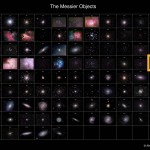"Upon one occasion, while engaged upon a seven-foot mirror, he did not remove his hands from it for 16 hours together." -from Caroline Herschel's obituary
Welcome to another Messier Monday here on Starts With A Bang! Each Monday, we highlight a different one of the 110 deep-sky objects that Messier catalogued so that comet-hunters wouldn't confuse these permanent fixtures with transient comets. But each object has a unique, remarkable story in its own right.
Image credit: The Messier Objects by Alistair Symon, from 2005-2009.
Out of the 110 objects, a full forty of them are…
Leviathan
Via HT I find Kerry Emanuel saying:
I think debate is good but we should be debating points that are actually debatable
and who could disagree with that? But the problem is who gets to say what is debatable. You and I know, of course. But the wackoes don't [What is the Plural of "wacko"? Is it -oes or -os? And what about "Bozoes" - that looks wrong]. Or rather, it is impossible to distinguish from outside their heads the difference between "this is debatable" and "I'm going to force you to debate this if I can, either because it plays well or in order to avoid debating real issues" (compare…
I haven't been nice to Hobbes for a bit, so:
When God speaketh to man, it must be either immediately or by mediation of another man, to whom He had formerly spoken by Himself immediately. How God speaketh to a man immediately may be understood by those well enough to whom He hath so spoken; but how the same should be understood by another is hard, if not impossible, to know. For if a man pretend to me that God hath spoken to him supernaturally, and immediately, and I make doubt of it, I cannot easily perceive what argument he can produce to oblige me to believe it.
There. Isn't that wonderful…
English political philosopher Thomas Hobbes (1588 - 1679) is widely held as the "father of political science." His 1651 book Leviathan makes the case for why monarchy is the only political system that is consistent with human nature. He bases his argument on the following assumption about humans in "the state of nature" (what we would now call indigenous peoples):
Let us return again to the state of nature, and consider men as if but even now sprung out of the earth, and suddenly, like mushrooms, come to full maturity without all kind of engagement to each other . . . Whatsoever therefore…
